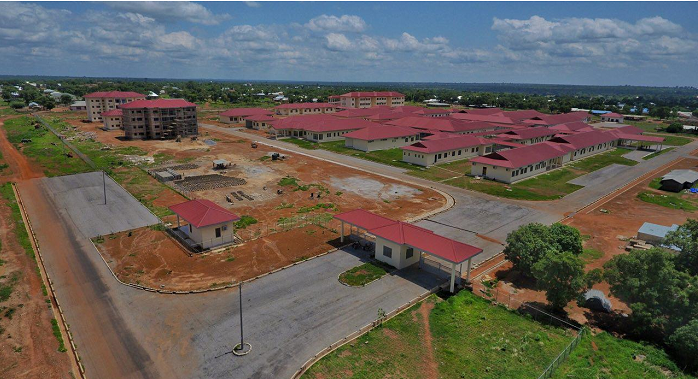
New Wa Regional Hospital defines modernity
It is by no means the largest health facility in Ghana, but the new Upper West Regional Hospital may well serve a modest definition of modernity when it becomes operational later this year.
A string of sophisticated installations – including an oxygengenerating system that feeds relevant sections of the facility with the gas; a centralised and computerised airconditioning mechanism that can process fresh air and release it to replace existing air in the enclosed areas of the hospital; and a multiplesource water system – make the hospital a gratifying investment.
Indeed, the oxygen is processed by harvesting fresh air from the open environment and released through pipes to the clinics, wards, etc., and accessed directly from the pipes, with the traditional cylinders serving only as backup.
Structures and facilities
The edifice features a combination of single-storey and high-rise structures spread out on a 133,000m² land area and connected by a fine network of disability-friendly walkways, with an attractive green of growing grass on the outside of the walls in between the drainage system.
It hosts 12 different clinics – including paediatric, maternal health, ear, nose and throat (ENT), and dental facilities, with an accompanying pharmaceutical department that has a storage space fitted with drug-preserving refrigerating equipment.
It also boasts seven different theatres: four of them on a surgical suite, two at the obstetrics and gyneacology department, and one at the emergency and casualty department.
There is an administrative block, an emergency/casualty unit, a radiology unit, a laboratory and blood bank, a physiotherapy unit, a burns unit, an intensive care unit, a threestorey in-patient block, a mortuary facility, three structures of 20-unit staff accommodation and a parking space for 300 cars.
While these are somehow standard facilities required at any health centre, Ghana's peculiarly challenged health system – where only the out-patient department (OPD) is guaranteed in many parts of the country – has made them luxury provisions for both health professionals and patients.
In some cases, they exist only in improvised forms to provide the relevant services to patients in the absence of an alternative facility in the neighbourhood.
But at the new 160-bed Regional Hospital in Wa, the facility will be able to accommodate eight simultaneous deliveries, with backup power plants, a laundry that will serve both staff and patients, a hospital kitchen and a maintenance unit, making it a complete whole.
Referral facility
Primarily, it is going to be a referral facility for all of Upper West Region and beyond to treat more complex health conditions, but $61 million investment as priced originally will also employ professionals across the health service delivery scope.
Site engineers of the project contractors, Euroget de-Invest, said 90 per cent of work on the facility had been covered as of last Tuesday, and expect to hand over the hospital by October.
The Country Manager of Euroget de-Invest, Mr Prince Armah, had led a team from Accra to the site to assess the progress of work for a project that started in 2010 – which is just one of nine similar hospital projects being undertaken by Euroget de-Invest across the country.
Project tour
The tour of the facility under the guide of three project engineers was in itself both tiring and exciting. While covering the vast area on foot, switching from one walkway to another and touching base with the clinics, units, blocks and installations induced sweat, the extent of work done and the technological innovations on sight were heartwarming spectacles that compensated for any discomfort.
The project's Head Engineer, Ahmed Abu Shamaa, told Daily Graphic during an interaction that only a few installations, as well as finishing of landscaping work and fitting of some electrical finishing materials, remained to be completed.
The biggest issues of physical infrastructure – including the physical hospital and staff accommodation structures, sewerage network, water supply network, electrical network and cables, doors and windows – were all completed, he said.
Other similarly important installations such as a water treatment plant, a water reservoir, a sewerage treatment plant and a medical waste treatment system have all been fixed, while 70 per cent of all furniture were on site, according to Mr Abu Shamaa.
He explained that while majority of the fittings were already on site, technical processes demanded that some installations waited until others were done.
Mr Abu Shamaa admitted that the project had delayed but also conceded that it was purely due to administrative challenges rather than one occasioned at the project site.
Mr Armah explained that the bureaucratic processes – including acquiring documentation for the necessary tax exemptions required to clear some imported materials – took longer than expected, leading to the delay.
As a result, the contractors are still counting the high cost of demurrage imposed by the excessive delay in clearing items imported for the Wa Regional Hospital project.
Beyond this, however, there are positives in the offing.
Project engineers are projecting that the oxygen-generating system could supply other health centres within the neighbourhood in a major step to overcome one of the biggest challenges that confront Ghana's health system.
An administrator at Euroget, Mr Baba Anaba, added that the turnkey project “should absorb nurses and other health professionals still awaiting their postings, not to talk about other direct and indirect jobs for the youth in Wa and surrounding areas”.